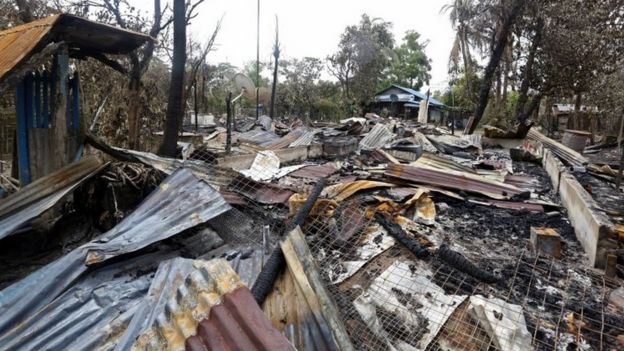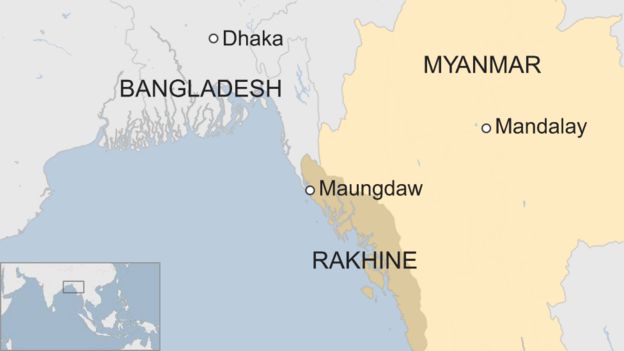Rohingya Insurgents declare temporary ceasefire
Rohingya Muslim insurgents in Myanmar have declared a one-month unilateral ceasefire to ease the humanitarian crisis in northern Rakhine state.
The Arakan Rohingya Salvation Army (Arsa) said the truce would start on Sunday, urging Mynamar’s army to lay down weapons as well.
Arsa attacks on police on 25 August triggered a response by the military.
About 290,000 Rohingya are said to have fled Rakhine and sought shelter over the border in Bangladesh since then.
The UN says that aid groups urgently need $77m (£58m) to help Rohingya who have fled Myanmar.
There is a desperate need for food, water and health services for new arrivals in Cox’s Bazaar, the UN added.
Rohingya residents – a stateless, mostly Muslim minority in Buddhist-majority Myanmar – say the military and Rakhine Buddhists are waging a brutal campaign against them, burning their villages.
Myanmar rejects this, saying its military is fighting against Rohingya “terrorists”.
Arsa announced its ceasefire in a statement on Saturday.
It also asked humanitarian organisations to resume their work.
Myanmar so far has made no public comments on the insurgents’ initiative.
 Image copyrightEPA
Image copyrightEPAAid agencies in Cox’s Bazaar say they are overwhelmed by the numbers fleeing, while reporters at the scene have described seeing thousands of Rohingya waiting at roadsides, begging and chasing food trucks.
An AP reporter saw one man collapsing from hunger while queuing at a food distribution point.
The UN Resident Co-ordinator in Bangladesh, Robert Watkins, said: “There is now an urgent need for 60,000 new shelters, as well as food, clean water and health services, including specialist mental health services and support for survivors of sexual violence.”
Those who have fled Rakhine describe village burnings, beatings and killings at the hands of the security forces and Buddhist youths.
The Myanmar government says it is the Rohingya militants and the Muslim villagers themselves who are burning their own homes and attacking non-Muslims – many of whom have also fled the violence.
But a BBC reporter in Rakhine state on Thursday saw a Muslim village being burned, apparently by a group of Rakhine Buddhists, contradicting the official version of events.

Also on Saturday, rights group Amnesty International accused Myanmar’s military of planting landmines at the border with Bangladesh.
Bangladeshi border guards and villagers have told the BBC that they witnessed more than 100 Myanmar soldiers walking by and apparently planting landmines at the border.
Bangladeshi officials have said they believe Myanmar government forces are planting the landmines to stop the Rohingya returning to their villages.
A Myanmar military source said no landmines had been planted recently, while a government spokesman told Reuters more information was needed.
The Rohingya plight is sparking concern and protests in many nations, and Myanmar’s de facto leader Aung San Suu Kyi has been criticised for failing to protect them.
Various world leaders have urged Ms Suu Kyi, a Nobel Peace laureate who spent years under house arrest for her pro-democracy activism, to speak out on behalf of the Rohingya.












